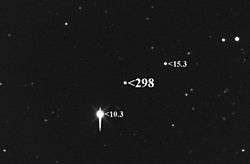298 Baptistina
|
Asteroid 298 Baptistina (apparent magnitude 15.2) near a mag 15.3 star. | |
| Discovery | |
|---|---|
| Discovered by | Auguste Charlois |
| Discovery date | 9 September 1890 |
| Designations | |
|
Main belt, Baptistina family | |
| Orbital characteristics[1] | |
| Epoch 31 July 2016 (JD 2457600.5) | |
| Uncertainty parameter 0 | |
| Observation arc | 123.99 yr (45289 d) |
| Aphelion | 2.4805 AU (371.08 Gm) |
| Perihelion | 2.0475 AU (306.30 Gm) |
| 2.2640 AU (338.69 Gm) | |
| Eccentricity | 0.095630 |
| 3.41 yr (1244.3 d) | |
Average orbital speed | 19.8 km/s |
| 209.69° | |
| 0° 17m 21.588s / day | |
| Inclination | 6.2884° |
| 8.2161° | |
| 135.004° | |
| Earth MOID | 1.06333 AU (159.072 Gm) |
| Jupiter MOID | 2.52351 AU (377.512 Gm) |
| Jupiter Tisserand parameter | 3.604 |
| Physical characteristics | |
| Dimensions | 13–30 km[2][3] |
|
16.23 h (0.676 d)[1] 16.23±0.02 hours[3] | |
| X-type | |
| 11.2 | |
|
| |
298 Baptistina is an asteroid orbiting in the asteroid belt. It is the namesake of the Baptistina family. It was discovered on September 9, 1890, by Auguste Charlois of Nice. The source of its name is unknown.[4] It measures somewhere around 13 to 30 kilometres (8 to 19 mi) in diameter. Although it has an orbit similar to the Flora family asteroids, Baptistina is an unrelated interloper.[5] It was once considered a possible source of the impactor that caused the extinction of the dinosaurs, a possibility ruled out by the Wide-field Infrared Survey Explorer in 2011. (See Baptistina family.)
References
- 1 2 "298 Baptistina". JPL Small-Body Database. NASA/Jet Propulsion Laboratory. Retrieved 11 May 2016.
- ↑ Reddy V., et al. (2008). Composition of 298 Baptistina: Implications for K–T Impactor Link, Asteroids, Comets, Meteors conference.
- 1 2 Majaess D., Higgins D., Molnar L., Haegert M., Lane D., Turner D., Nielsen I. (2008). New Constraints on the Asteroid 298 Baptistina, the Alleged Family Member of the K/T Impactor, accepted for publication in the JRASC
- ↑ Lutz D. Schmadel, Dictionary of Minor Planet Names, p.41.
- ↑ M. Florczak et al. A Visible Spectroscopic Survey of the Flora Clan, Icarus Vol. 133, p. 233 (1998)
External links
This article is issued from Wikipedia - version of the 9/10/2016. The text is available under the Creative Commons Attribution/Share Alike but additional terms may apply for the media files.
